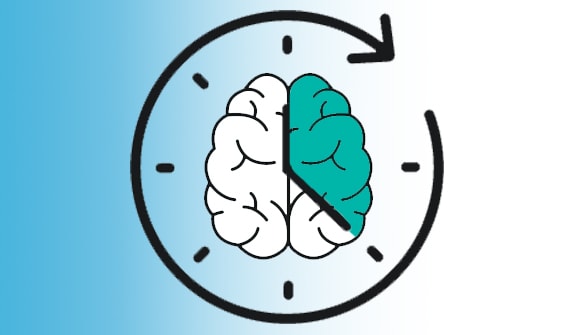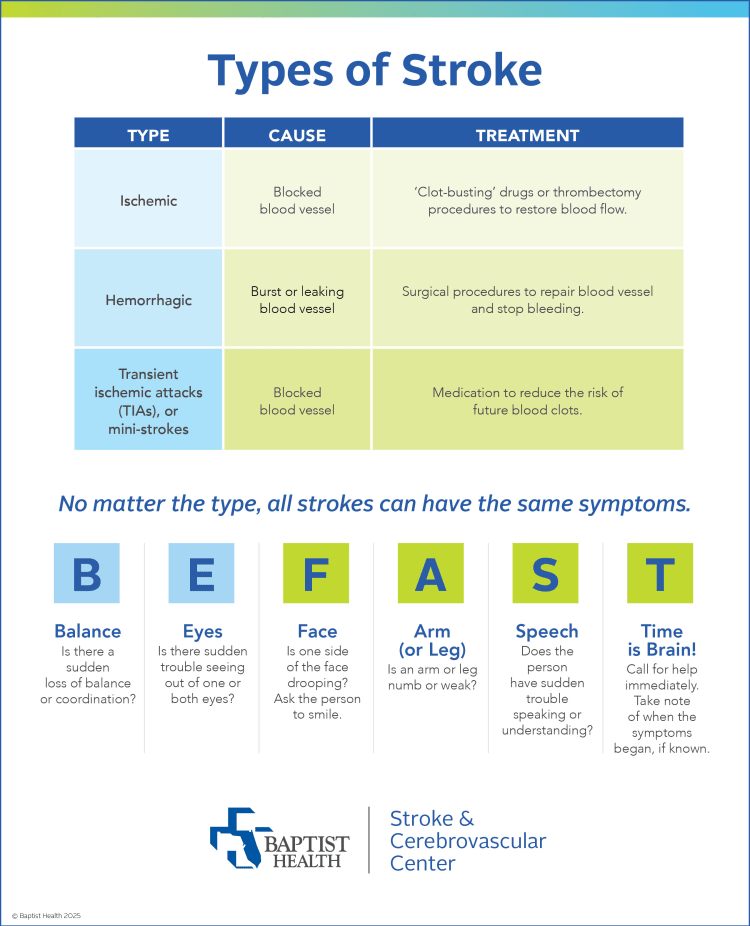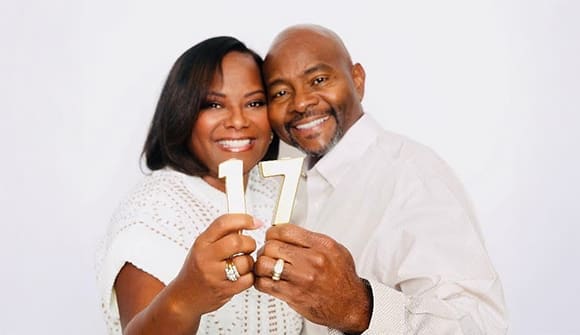Which stroke is striking?
Different types of strokes, plus causes and treatments.
Article Date:

When it comes to stroke, time is brain. However, not all strokes are created equal. Mohamad Chmayssani, MD, neurologist and neurocritical care specialist with Baptist Lyerly Neurosurgery, explained how learning to quickly spot the symptoms of each type of stroke in an emergency could help save a life.
Ischemic vs. hemorrhagic strokes
There are two main types of strokes: ischemic and hemorrhagic. The majority of strokes are ischemic, meaning they occur when arteries become blocked with clots or plaque.
Some people may have a temporary disruption of blood flow to the brain, known as a transient ischemic attack (TIA), or mini-stroke. Like ischemic strokes, mini-strokes are caused by blocked blood vessels in the brain. But unlike full strokes, mini-strokes don't cause brain damage or leave lasting symptoms because blood flow to the brain usually returns on its own.
However, a mini-stroke can be a warning sign of a future stroke and should always be treated as a medical emergency.
Just 12% of strokes are hemorrhagic. This rare disease is caused when a weak blood vessel leaks or bursts, forcing blood into the brain. High blood pressure and brain aneurysms are examples of conditions that can cause one.
Hemorrhagic strokes that cause bleeding in the brain can lead to severe symptoms. As the amount of blood increases, the buildup of pressure can cause brain tissue damage, unconsciousness or even death.
"During a hemorrhagic stroke, most patients experience a sudden severe headache, what they call the 'worst headache of their lives,'" Dr. Chmayssani said. "These often happen when a brain aneurysm ruptures, and this can be life-threatening."
But, according to Dr. Chmayssani, both types of strokes can cause similar symptoms.

"Symptoms such as drowsiness and unconsciousness can also be signs of a severe ischemic or hemorrhagic stroke," Dr. Chmayssani said. "It's important to seek medical attention immediately to increase your chances for treatment and recovery."
Focus on risk factors
Strokes often seem to occur out of the blue, but according to Dr. Chmayssani, both types of strokes share the same risk factors, including:
- Atrial fibrillation (Afib)
- Alcohol abuse
- Cardiac disease
- Cigarette use
- Diabetes
- High cholesterol
- Hypertension
- Obesity
- Physical inactivity
Gold standard stroke treatments
Every second counts when it comes to any type of stroke. Patients who receive care quickly have the best chance of making a full recovery. The longer someone suffers from a stroke, the greater the chance of serious disability or even death.
To treat ischemic strokes, physicians use medications called "clot busters" to break up blood clots and restore blood flow. Patients can also receive a procedure called a mechanical thrombectomy in addition to or as a replacement for clot-busting drugs to remove clots from blood vessels.
All hemorrhagic strokes are treated with medications to reduce swelling and prevent seizures. In addition, some may require surgical procedures to seal the burst blood vessel and stop bleeding to prevent life-threatening complications.
Although these treatments are now the gold standard, not all medical facilities have rapid access to the resources required to diagnose and treat strokes. To answer the call, Baptist Health's Stroke & Cerebrovascular Center has adopted telehealth resources for clinical stroke care.
"Tele-stroke services have filled the void," Dr. Chmayssani said. "We can now assess symptoms, coordinate procedures, administer medications and arrange for transfers virtually, helping us detect strokes early and ensure our patients have the best chance at recovery."
BE FAST to save the brain
Call 911 if you notice any signs or symptoms of a stroke. The faster you seek care, the better your chances for treatment and recovery. To find out your risks for a stroke, complete this Stroke Risk Scorecard today and discuss your results with your health care provider.



